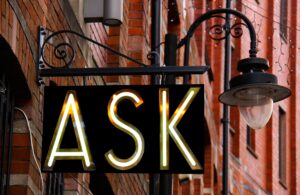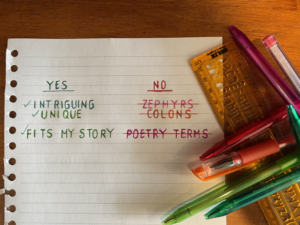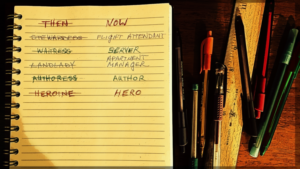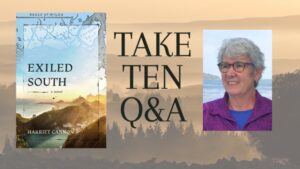Posts by Guest
Please welcome guest Jennifer L. Gatewood (aka Jennifer Bohmueller) to Writer Unboxed today! Jennifer had the thought to share some of the lessons learned since she’s become agented–she is now represented by Lori Galvin at Aevitas Creative Management–and we knew from experience those lessons would be many. Jennifer, who reports that she is “currently writing a domestic suspense novel while plotting others,” has a degree in journalism and works as a communications consultant and freelance writer. Her short stories have been published online and in print. When she’s not writing or reading, she’s traveling or hiking.
You can follow Jennifer on Threads or Twitter or check out her website at www.jennifergatewood.com
It’s only been a few months, but there’s so much I’ve learned since signing with my agent last fall. So much so that, ironically, I feel I could write a book about it. Maybe one day I will. But until then, here are the top five lessons I learned after signing with my agent.
1. Writing is solitary, but you don’t have to do it alone. During one of my first calls with my agent, I asked her if she had any advice for me. She stressed I should find other writer friends. I didn’t know what a lifesaver this piece of advice would be. I soon learned how important it was to have cheerleaders, confidants, and an understanding ear in my corner. I wasn’t prepared for the rollercoaster of emotions during the process—feeling like I had written the next Pulitzer Prize piece of literature and then feeling like everything I wrote was a big stinking pile of trash. I experienced a severe bout of Imposter Syndrome right after I received my first round of constructive feedback from my agent. (I talk about overcoming Imposter Syndrome on The PPS Club Podcast.) If I didn’t have my writer friends cheering me on, I have no doubt I would have shelved my novel and gone back to my day job.
2. You’ll need to level-up on feedback. I had no idea I would get feedback about my manuscript. I thought once an agent signed you, then you had made it. Surely the next step was a hefty contract with one of the big publishing houses and on to the New York Times Best Sellers list. I giggle-snort at how naïve I was. It was a wake-up call when my agent mentioned what wasn’t working with my novel and why it wasn’t quite ready to go out on submission. It was then I realized I needed to be very receptive to feedback. Not just from my agent, but from beta readers and critique partners. I’m not in any way recommending that you nod and go along with any and all feedback. You are still the author and know your characters and their story best. Writers often get nervous talking about the revision stage, and voice concern that their book will change. My book has changed for sure based on feedback I’ve received. However, I strongly believe it’s changed for the better—it’s more focused, has a stronger plot and characters, a better ending, and the […]
Read MorePlease welcome Marcie Geffner back to Writer Unboxed today! Marcie reached out recently to ask if we might be interested in hearing her process of working with ChatGPT to come up with a book title, and how could we refuse? The post was as entertaining as we had hoped. Thank you, Marcie, for sending it!
Marcie Geffner is a working freelance writer and work-in-progress novelist. Her stories about real estate and banking have been published in the Los Angeles Times, The Washington Post and U.S. News & World Report, among others. She earned a bachelor’s degree in English with high honors at UCLA and an MBA at Pepperdine University. Originally from Los Angeles, she currently lives in Ventura, California.
Learn more about Marcie on her website.
Book titles are important. Writing them isn’t easy. With several working titles for my novel already on the scrap heap, I was ready for a new approach. Could ChatGPT, a text-generating algorithm, suggest new ideas for titles that I’d like and others would love?
Let’s find out.
Step one: Log in to OpenAI, access ChatGPT, and begin a New Chat.
Step two: Instruct ChatGPT to use a 500-word synopsis that I would provide to generate titles for a novel.
Step three: Copy-paste my synopsis and press Enter.
Six hours and 1,800 ChatGPT-generated titles later, I had 23 “maybe” ideas, including one—”The Wind Lords’ Curse”—that I especially liked and that caught the interest of my critique group, too.
Would I advise other authors to try this method to generate a book title? Short answer: yes. Using ChatGPT for this purpose was frustrating, time-consuming, and annoying. But trying to come up with more title idea on my own was also frustrating and time-consuming, if perhaps not as annoying. And, I ended up with a new title that I might never have thought of without ChatGPT’s suggestion. True, the title came from my synopsis, but it wasn’t word for word, and it didn’t actually take six hours and 1,800 titles for ChatGPT to suggest it. In fact, it was among the first thirty or so titles that came up after I provided the synopsis.
What did I learn from this exercise?
The most important lesson was that ChatGPT requires very specific instructions and it will follow those instructions exactly as they’re given, or it will find sneaky ways to sidestep the instructions, or it will completely ignore the instructions, sometimes repeatedly, and do its own thing.
Example 1: Zephyrs
My novel is about wind and weather. Early on, ChatGPT suggested multiple titles that contained the word “zephyr.” A fine word, perhaps, but one I didn’t want to use, so I added an instruction: “Do not use the word ‘zephyr’ in the titles.”
Yet still, the zephyrs continued. Before long, I had quite a collection: “Zephyr’s Journey,” “Zephyr’s Whispers,” “Zephyr’s Chorus,” “Zephyr’s Lament,” “Breath of the Eolian Zephyrs,” “Whispering Zephyrs,” “Echoes of the Zephyr,” “Chasing the Zephyr,” “Embracing Zephyrs of Transformation,” “Serenade of the Luminous Zephyrs,” and many more.
When I (temporarily) convinced ChatGPT not to give me any more titles with the word “zephyr,” it suggested “The Zephyrian Conundrum” and “Zephyrus’ Lament.”
Oy.
With a new instruction, “Do not use words that begin with the letter ‘z’ in the titles,” the zephyrs continued, though they weren’t as numerous. Altogether, […]
Read MorePlease welcome guest and author Jennifer De Leon to Writer Unboxed! WU contributor Desmond Hall made the introduction, and said we absolutely had to meet Jennifer. We’re so glad that he did, and we think you’ll feel the same once you’ve read today’s post. More about Jennifer from her bio:
Jennifer De Leon is author of the YA novel Don’t Ask Me Where I’m From (Simon & Schuster, 2020), which was a Junior Library Guild selection, and the Juniper Award winning essay collection White Space: Essays on Culture, Race, & Writing (UMass Press). Her latest YA novel, Borderless, releases today!
Borderless follows Maya, a talented teen fashion designer who is caught in the crosshairs of gang violence, when she and her mother set off on a perilous journey from Guatemala City to the US in this heart-wrenching young adult novel that gives humanity to migrants at our border.
You can connect with Jennifer on Twitter, Instagram, and Facebook.
My parents came to this country with hopes and dreams like so many immigrants do. They wanted to learn English, become U.S. citizens, work, send money home, and eventually—get married, have children, and buy a house. The dreams they had for their three daughters included: graduate from college, become independent women (never having to rely on anyone, certainly not a man), and have a choice in your profession. My father, in particular, always told us, “Get a job where you don’t have to work with your hands.” He worked in a steel manufacturing factory for decades, and my mother was a housekeeper. I knew what he meant, although as a writer, technically I work with my hands every day.
For me, the path toward becoming a published author was not easy. While I loved reading, and I spent endless hours writing in my journal, I didn’t really think that being an author was a real possibility. Maybe when I was older, in my seventies, I thought. Because this was the image I had of writers—older, sophisticated, well-read and well-traveled, white-haired, usually men. I didn’t read a book by a Latina author until I was a freshman in college (The House on Mango Street by Sandra Cisneros). Being a writer was something other people did, not in my family, not me.
Yet, after reading Cisneros, I began to believe. I asked questions. I persevered. I moved to California. I became a teacher. I held so many odd jobs in between (house sitter, assistant, cashier, nanny, receptionist). All the while, I read and wrote like crazy. I attended conferences and writing workshops and graduate programs and salons. I realized that I had inherited my parents’ trailblazer essence, as I, too, was carving a new path.
Much has been said about being a first-generation college graduate, or a first-time home buyer, or the first woman in space. But being the first writer in the family is such a unique and often emotional experience. Here are a few things that have helped me.
Remember that it’s a job. It’s easy to say now, but for a long time I didn’t see writing as “a real job.” It was my hobby. It was something I […]
Read MorePhoto: Alessandro Lucioni
Please welcome author Julie Gerstenblatt to WU today for a uniquely fun post on fashion and authors!
Julie holds a doctorate in Curriculum and Instruction from Teachers College, Columbia University. Her essays have appeared in The Huffington Post, Kveller, Cognoscenti, and Grown & Flown, among others. When not writing, Julie is a college essay coach, as well as a producer and on-air host for A Mighty Blaze, which has grown into a leading resource for author interviews. A native New Yorker, Julie now lives in coastal Rhode Island with her family and one very smart shichon poo.
Daughter of Nantucket, which released on March 14th, is her first novel.
Set against Nantucket’s Great Fire of 1846, this sweeping, emotional novel brings together three courageous women battling to save everything they hold dear. In a starred review, Booklist hails it as “a beautiful historical novel… Gerstenblatt’s distinctive tale, a triumph in storytelling, celebrates the courage and tenacity of women.”
You can follow Julie on Instagram @juliegerstenblatt and sign up for her newsletter on her website.
Who are you wearing? is a question hardly ever asked of a writer. Who are you reading? Sure. What are you working on now? Absolutely. But inquiries from the press–and the reading public–about fashion have largely eluded the literary set, with notable exceptions made for icons like Truman Capote and Jackie Collins. And, sure, David and Amy Sedaris. Perhaps this is due to the fact that writers hardly ever leave the house. Red carpet moments are rare for us creatives, who historically worked from home in comfy sweatpants eons before that became a necessary evil for the masses. And secondly, writers tend to make less money than professionals in pretty much any other field–with notable exceptions made for the fictional Carrie Bradshaw–thus choosing to spend their savings on items more practical than Jimmy Choos, like rent. And health insurance.
But, as reported in the 2017 New York Times article entitled “Your Literary Idols and Their Wardrobes,” Vanessa Friedman debunks that myth–at least for 50 of the world’s most notable authors. The article celebrated the release at the time of the book Legendary Authors and The Clothes They Wore by journalist Terry Newman, which features notable style icons including Zadie Smith and Fran Liebowitz, Maya Angelou and Tom Wolffe. Joan Didion graces the cover, leaning against a Stingray with a cigarette in her hand, looking effortlessly cool–if a little bit irked–in a long, casual dress and flip-flops.
But we can’t all be Didion, can we?
In the article, Friedman states that author Terry Newman’s “surprisingly convincing thesis is that the sartorial choices authors make are deeply connected to the narrative choices they make — or, as Beckett put it, “the fabric of language” they use. And that as a result, in developing their own idiosyncratic style signatures, they created trends that fashion itself seized on, was inspired by and still finds a fertile source of ideation today.” In other words, when they do step out into public, truly fashionable authors are in dialogue with their art.
And, in […]
Read More
Please welcome Marcie Geffner back to Writer Unboxed today! Marcie reached out recently with a provocative post idea too good to pass up: Was it time to nix “heroines”?
Marcie is a working freelance writer and work-in-progress novelist. Her stories about real estate and banking have been published in the Los Angeles Times, The Washington Post and U.S. News & World Report, among others. She earned a bachelor’s degree in English with high honors at UCLA and an MBA at Pepperdine University. Originally from Los Angeles, she currently lives in Ventura, California.
Learn more about Marcie on her website.
A recent WriterUnboxed column argued that a fictional character doesn’t have to win a big, loud, violent battle at the end of the story to be a “hero or heroine.” It’s an important discussion, within which the use of the word “heroine” may seem a minor point.
And yet, to me, it mattered. Because the word “heroine” creates an unnecessary and potentially harmful gender distinction in the idea of a “hero.” I had to wonder: Why can’t all of our fictional characters be “heroes”?
I might’ve written a comment. I needed to write a column.
The word “heroine” has no meaning other than “female hero.” That might imply strength, like “girl power,” or it might be perceived as cutesy, frilly or worse, patronizing. But those implications don’t matter as much as the fact that the category of “hero” doesn’t need this gender division any more than the categories of “male nurse” or “female Supreme Court Justice.” We do not need “mailmen” when everyone can be a “mail carrier.”
There are, of course, many other examples of such pointless and outdated gender distinctions: waitress, stewardess, lady doctor, lady Realtor, comedienne, manageress, landlady, headmistress, chairwoman, hostess—need I go on?
Like “heroine,” these unnecessarily gendered terms divide people into binary categories when we should all know by now that human gender is not binary. If gender exists–some experts say it does; some say it doesn’t–, at the very least it includes people along a spectrum as well as people who don’t fit on that spectrum. And it isn’t necessarily a defining characteristic of anyone’s personality or ability.
These unnecessary gender labels may seem benign. They aren’t. Code words in job descriptions, bias and discrimination in hiring, promoting and firing decisions, and unequal pay for equal work have been well documented. So, too, has the “pink collar”-ing of certain fields of work. Is a “heroine” entitled to the same career opportunities and compensation as a “hero”? Or will she have to fight for her equality in the workplace and the world?
The Academy of Motion Picture Arts and Sciences preserves its practice of awarding Oscars in Actor and Actress categories, one each for Best and one each for Best Supporting. With four categories, rather than two, the Academy can recognize more nominees and winners, but the additional categories unnecessarily insert gender differences where, it seems to me, they shouldn’t be relevant. Some female actors find the term “actresses” not only objectionable, but offensive.
Thread: “Actor” vs “Actress”
I don’t find the term actress offensive or think people who use the term actress are wrong. Sometimes it’s easier (in casting calls etc) to use […]
Read MoreFar more than an art and a genre, true literary fiction is a field of scholarly exploration and debate. Who better to lead such a discussion than an author who honed his craft as a professor of literature? Today I’m pleased to introduce former Harvard literature professor and Guggenheim fellow Thomas Richards, whose second novel, Mrs. Sinden, was published last month by Global Collective Publishers.
Jane Austen’s Emma, Tolstoy’s Anna Karenina, Virginia Woolf’s Clarissa Dalloway — all have one thing in common that makes them feel so alive: characters with three dimensionality.
Less a matter of a writer’s style than a function of the fictional means by which we perceive human character in all its fullness, these means are perception, emotion, and cognition, or, to use the plainer words I prefer, seeing, feeling, and thinking.
But how does one put together a character in all three of these dimensions?
Character in fiction is really a series of clusters of these three-dimensional portraits placed in a story in series. In my most recent novel, Mrs Sinden, I still clearly remember the process of layering by which most of my characters were created. Many readers have told me that I definitely crossed the threshold into thereness in the novel with Jessica Sinden: at a certain point they began to feel that she really existed. That is, she became fully present to them as a human being. Readers also found that this presence deepened as the narrative proceeded.
Consider the following passage:
That afternoon she was waiting for him [her son, Tristan] in the dining room. A fire was going in the fireplace. They had one of the few real fireplaces in Hong Kong and she was very proud of it.Even in December it made the room uncomfortably hot.
Thankfully, the fire had died down a bit by the time he came out from his bedroom. His mother was frugal with wood and sat next to the fire, poking it from time to time, as though to remind the flames that they did not quite measure up. Her eyes lit up when the gutted logs crumbled into the embers. It seemed to confirm her opinion of the fire.
It demonstrates five core characteristics of three dimensional writing:
A passing detail becomes—nothing less than everything
Jessica Sinden is stirring the logs in her fireplace. But how much more is going on! In fact, her entire attitude not just toward life, but toward its people and its larger process, is perfectly summed up in this one detail—stirring a fire.
Why? You first learn that Jessica has one of the few “real” fireplaces in Hong Kong. Hong Kong is subtropical, so a British household with a hearth is an act of defiance; British properties will be maintained no matter what the surrounding climate is. No matter, too, that it actually makes the room too hot in a […]
Read MoreTherese here to introduce today’s guest post by author Erma Clare. Erma, who recently attended our own WU OnConference, reached out a couple of weeks ago with an idea to write a piece for WU about Language AI, which has writers intrigued, unnerved, and filled with questions. She shared that her graduate degree was in AI modeling, and that her thesis was in fact about the topic of “AI to text” and how that could be applied in practice. So I perked up, and I said yes.
More about Erma from her bio:
Erma’s childhood dream of writing fell away during a long career in finance. When a late career twist landed her back in school, learning about Language AIs revived her childhood dream of writing. Her debut novel was published in November 2022. A Fed Spirit is narrated by a ghost and set in a Federal Reserve Bank.
Empowered by Erma’s article, I did my own deep-dive into ChatGPT. At the end of this piece you’ll find screen shots from my experience questioning ChatGPT directly about how it can help writers.
Welcome, Erma, and thank you. I believe ChatGPT can revolutionize the way writers work with technology, and I look forward to learning more about it.
Readers, you can follow Erma on Instagram.
You’ve probably seen the buzz about ChatGPT in the news, on social media, and in authors’ newsletters. Before you’ve even tried it, you might have seen announcements of other Language AIs. You might wonder whether they are to be feared, embraced, or safely ignored. Or a ploy to steal the minutes you regained when you abandoned Wordle, or a game-changer such as was Google way back. Or are they up-and-coming authors? I hope to provide answers.
What are they?
Language AIs facilitate humans’ ability to productively use vast amounts of text. They do this by “reading” the text their developers chose, chopping the text up and transforming it to numerical measures, and using the measures to search for probable patterns. Those patterns include semantic and contextual relationships between words, grammar structure, and more. When users pose a question, the Language AI uses statistics to predict which specific patterns will satisfy a request.
Large Language AIs are true game-changers. Since ChatGPT was released, Microsoft released a version of Bing that uses ChatGPT and Google announced its version, Bard, is coming. They are large because of the billions of dials that are turning as they read massive amounts of text. ChatGPT’s dials were set after it finished reading in 2021, though they are likely tweaked in real time when users tag an answer as inappropriate, dangerous, or wrong. Bing is reading in real time so its dials continue to spin. Those dials control the AIs’ writing.
Can they create a story?
When I asked ChatGPT to tell me a story about a character who was the same age and gender and had a same event as one of my published novel’s characters, it returned a story of about two hundred words and its character’s emotional arc matched my own. Though I knew the arc was not original when I wrote it, I was rattled by ChatGPT having nailed it.
I remembered a conversation with my novel’s developmental editor about […]
Read MorePlease welcome bestselling author Jamie Beck to Writer Unboxed today! Recently, Jamie asked the opinion of other writers over social media about trigger warnings on novels, and such a robust conversation evolved that it seemed obvious: This would make a great topic to explore on WU. Happily, Jamie agreed to write the piece. From her bio:
Jamie Beck is a Wall Street Journal and USA Today bestselling and award-winning author of 18 novels, many of which have been translated into multiple languages and have collectively sold more than three million copies worldwide. Critics at Kirkus, Publishers Weekly, and Booklist have respectively called her work “smart,” “uplifting,” and “entertaining.” In addition to writing novels, she enjoys dancing around the kitchen while cooking, and hitting the slopes in Vermont and Utah. Above all, she is a grateful wife and mother to a very patient, supportive family.
Learn more about Jamie and the novel that sparked the conversation, The Beauty of Rain, on Jamie’s website: www.jamiebeck.com.
My publisher engaged a sensitivity reader to evaluate the portrayal of a neurodiverse character in my summer 2023 release (The Beauty of Rain). I eagerly anticipated the reader’s feedback, whose notes on that aspect of the manuscript were ultimately helpful and unsurprising. Conversely, her recommendation that I add trigger warnings about suicidal ideation and prescription drug abuse did momentarily throw me.
Most everyone knows that a trigger warning is essentially a statement cautioning a consumer/reader that the content may be disturbing or induce a traumatic response. Although these labels are not as commonplace in publishing as they are in film, television, and music, in recent years they’ve begun to appear on a book’s digital detail page, its back jacket, or in an author’s note. The big argument in favor of such labels is that they give a reader the choice to avoid a book that contains material said reader might find harmful or that could unwittingly force them to revisit past trauma.
While I consider myself to be a compassionate person who would never purposely cause someone harm, my initial reaction was to reject the suggestion. Trust me, I know that sounds awful, but I worried that the warnings somewhat mischaracterized the tone and themes in my work. After all, if A Man Called Ove had included a suicidal ideation warning, many people might have missed out on an extremely life-affirming story. I discussed my concern with my agent and editor, both of whom also expressed doubts about the necessity of the warnings.
Coincidentally, around that same time I was doom-scrolling on Twitter and came across a New Yorker article from 2021 entitled “What if trigger warnings don’t work?” That piece discusses studies conducted with respect to the effectiveness of content warnings in academia (which are on the rise). The data suggests that such warnings not only don’t work, but they may inflict more harm by causing additional stress and reinforcing the idea that a trauma is central to a survivor’s identity (which is the opposite of PTSD therapy goals). On Twitter and in an Authors Guild discussion thread on this topic, more than one licensed therapist concurred with the article’s conclusions and believed trigger warnings had no meaningful effect.
You might […]
Read MorePlease welcome debut author Allyson Rice to Writer Unboxed today!
After many years as a working actress (Connor Walsh on As the World Turns), Allyson turned her attention to other pursuits– running, yoga, meditation, running retreats for women, writing/directing/producing/performing in an award-winning comedic rap video, creating a line of coloring books for women, producing a handmade jewelry line, and writing a novel.
Her debut, The Key to Circus-Mom Highway, releases today!
“In this rollicking family dramedy, debut author Rice sends three lovable siblings on a zany yet touching road trip. […] Rice’s sharp observations of society’s absurdity verge on the satirical and even on occasion veer toward delightfully crude. The conversational writing style, realistic banter, and frequent flashbacks bring to mind friends sharing juicy gossip… [F]ans of family drama with big laughs will enjoy this hilarious road-trip adventure.”
— BookLife
Writing The Key to Circus-Mom Highway required some interesting research, including Googling topics that might make a writer worry they’ll land on a federal watch list–which is what today’s post is about.
Learn more about Allyson and her many endeavors on her website. The Department of Homeland Security (and anyone else) can follow her on Instagram: @allysonriceauthor @allysonriceart @officialallysonrice.
I love the research aspect of writing a book. Even with fiction, I find there’s quite a lot of research to be done in the process of world-building. You don’t ever want a reader to be taken out of the flow of your story because they’re distracted by inaccuracies or generalizations. And it never fails that as I learn new facts about whatever subject I’m investigating, some choice tidbit revealed adds another unexpected layer to a part of the story that I initially didn’t think was connected to the research topic at hand. New layers are added to the plot or the to characters’ backstories almost accidentally like the novel is writing itself. For a writer, these synchronicities create enough resultant joy to get us through the hundreds of simultaneous frustrations.
While writing my recently completed novel, I spent several days learning how to write in a Cajun dialect for one very short scene. It took a bit of digging. When I couldn’t find a handy website titled HeresHowToWriteInaCajunDialect.com (go figure), I searched out message boards where people from the Deep South reminisced, including one glorious, currently-inactive thread from years ago about their favorite Cajun words and phrases when they were growing up. (I felt like a pioneer in the Old West who had just struck gold.) And the old one-eyed “Cajun pirate” that the protagonists briefly interact with at a Thibodeaux, Louisiana gas station came alive.
Because a road trip is a central feature of the book, I researched freeway routes and driving times on the “road-less-traveled” back roads through the South, choosing the towns where my protagonists would stop because the distances and times are crucial. They have an inflexible one-week timeframe and there’s an unplanned detour in the eleventh hour. Because I had lived in Mississippi when I was young (where the residents pronounced Lafayette County “lay-FAY-it”), I also spent a couple of days researching how the local residents pronounced the locations and business names in these towns in preparation for recording the audiobook.
At one point […]
Read MorePlease welcome guest author Henriette Lazaridis to Writer Unboxed today! Henriette’s new novel, TERRA NOVA, will be published by Pegasus Books in December 2022. Her debut novel, The Clover House, was a Boston Globe bestseller and a Target Emerging Authors pick. Her work has been published in such outlets as Elle, Forge, Narrative Magazine, The New York Times, New England Review, The Millions, WBUR’s Cognoscenti and Pangyrus, and she is a recipient of a Massachusetts Cultural Council Artists Grant. Henriette earned degrees in English literature from Middlebury College, Oxford University, where she was a Rhodes Scholar, and the University of Pennsylvania. Having taught English at Harvard, she now teaches at GrubStreet in Boston. Visit her website at https://www.henriettelazaridis.com/.
Linger, Tinker, Savor: Taking the Time to Get it Right
I came to novel-writing later in life, after a career in academia. Though I’d decided as a teenager that I wanted more than anything to be a novelist, one thing led to another, and I detoured into scholarship and teaching at the university level, and then I was almost forty when I realized I’d strayed from my once-held dream. Starting “late”—or so I thought—I became a Woman in a Hurry. It’s not that I wrote massive amounts right away. Quite the contrary, in fact. I didn’t take myself seriously for a few years and kept undermining myself by engaging in all manner of other pursuits on top of (and often in place of) writing. But even then, I was in a hurry mentally. When I did finally get serious about writing novels, I wanted everything to happen fast.
My first novel, The Clover House, set me up for some false expectations of speed to come. The novel went on sub on a Thursday and, by the Monday, I had phone interviews with three publishers. About three weeks later, I had a sale. This gave me the impression it would always go like this. You write the draft, you revise a little, you go on sub, and bingo, you sell. I imagined doing this on a sort of two-year timetable and queued up my ideas accordingly.
Insert a pause for sad-maniacal laughter.
No, the next manuscript I wrote did not go off into publication at lightning speed. Nor did the next one. But though the publishing world’s operations were slowing me down, I continued to write if not quickly then briskly. I began a third manuscript, and then set it aside to revise one of the two novels I’d already completed, reworking it under the skillful and attentive scrutiny of my then agent. Before the ink was barely dry on a finished draft of Terra Nova, I began and finished another manuscript, during the pandemic (didn’t everyone?), in a matter of months.
The take-away from all these manuscripts bouncing around in my writerly existence isn’t the speed of their creation. That’s, in fact, the cautionary tale. The real lesson is that the ones that really succeeded were the product of time and slowness. Notice that while we have a nifty word for when things are fast—speed!—the word for when things are slow is awkward. Slowness? And yet, there it is: a word that takes as much drawn-out time to say as is fitting for its meaning. What worked best for me as a […]
Read MorePlease welcome longtime Writer Unboxed community member Lancelot Schaubert back as our guest today! Lance is the author of the novel Bell Hammers.
“Schaubert recounts a mischievous man’s eight decades in Illinois’s Little Egypt region in his picaresque debut BELL HAMMERS. Remmy’s life of constant schemes and pranks and a lifelong feud with classmate Jim Johnstone and the local oil drilling company proves consequential. This is a hoot.”
– Publisher’s Weekly
More about Lance from his bio:
Two excerpts of Lancelot Schaubert’s (lanceschaubert.org) debut novel BELL HAMMERS sold to The New Haven Review (Yale’s Institute Library ) and The Misty Review, while a third excerpt was selected as a finalist for the last Glimmer Train Fiction Open in history. He has also sold poetry, fiction, and nonfiction to TOR (MacMillan), The Anglican Theological Review, McSweeney’s, Poker Pro’s World Series Edition, The Poet’s Market, Writer’s Digest, and many similar markets.
Spark + Echo chose him for their 2019 artist in residency, commissioning him to write four short stories.
He has published work in anthologies like Author in Progress, Harry Potter for Nerds, and Of Gods and Globes — the last of which he edited and featured stories by Juliet Marillier (whose story was nominated for an Aurealis award), Anne Greenwood Brown, Dr. Anthony Cirilla, LJ Cohen, FC Shultz, and Emily Munro. His work Cold Brewed reinvented the photonovel for the digital age and caught the attention of the Missouri Tourism Board who commissioned him to write and direct a second photonovel, The Joplin Undercurrent, in partnership with award-winning photographer, Mark Neuenschwander.
Lance shares free resources for writers on his website, HERE, where you can also learn more about him.
Stanza I: The Dragon.
In every medieval occidental story about dragons — actually, even in some of the medieval luck dragon stories — a dragon unattended grows. When it’s an occidental dragon, your own and the dragon’s greed and anxiety and unattended consequences worsen. The longer you refuse to face it, to do something — anything — to try to deal with the problem, the more the problem grows. That’s the nature of invasive species, of viruses (can I get a witness?), of mold, and of extended family drama or workplace gossip. It’s the nature of ignoring preventative maintenance for your mental health, of waiting until you’re 55 to start working out (you lose 1% of your muscle mass from that point on until you die), and of waiting for an oil change in your car (a relative of mine blew hers up this way).
It’s also the case internally. The problem left unattended grows your anxiety, your bitterness, your shame. Your refusal to grieve, to encounter the world with wonder, to play, to dance in the minefields — these all grow the problem in your mind. And so (to borrow a metaphor from a shared text, setting aside the reasons we share it) while Voldemort grows in the world, he also grows in your head. And you have to deal with the Voldemort within in order to kill the Voldemort without.
The longer you ignore the dragon, the bigger he gets.
How do you think Smaug got so powerful?
No homely lakelander wanted to deal with a dragon. No dwarf would harm his hoard.
Stanza II: The mice […]
Read MoreFormer regular WU contributor and New York Times bestselling author Allison Winn Scotch has a new book out today! THE REWIND, her ninth novel, was acquired in a five-way auction and has been otherwise receiving some significant buzz–it’s on Amazon’s Best Books of the Month list for November, and was named a Barnes & Noble Bookseller Favorite selection, and a Library Reads pick for November for starters. And just yesterday, a deal with Netflix was announced for a film based on THE REWIND (#confetti)! But book releases haven’t always been so rosy for Allison, and so we invited her to share with us the long-view of her career–where she’s been, the peaks and valleys, and what she’s learned along the way.
“Scotch’s latest is a second-chance rom-com set on a snowbound New England college campus at the turn of the millennium and told mainly through the internal monologues of the protagonists.” — Booklist, starred review
Learn more about Allison and her books on her website, and follow her on Instagram.
My ninth book is out today, and I’m having a wholly unique experience with its release. So I thought it might be valuable to talk about the peaks and valleys of a two-decade career with the benefit of some hindsight and perspective.
This book, THE REWIND, is my first book in a long time that is getting all those shiny bells and whistles that every author covets. Let me reiterate – this is my ninth book – and I’m only getting these now. It’s landed on a bunch of Editor’s Best of the Month, it has big splashy Hollywood interest, it’s getting viral buzz in a way that we all need these days. I tell you all this not because I’m boastful rather to say that for many years and for many books, it wasn’t this way, and I think it’s really important to discuss.
Let me go back in time to explain what I mean. Two decades ago, I wrote a novel. It probably wasn’t very good (ok it definitely wasn’t very good), but it got me an agent, and we shopped it around. And no one bought it. So I wrote another novel, and my then-agent (that’s foreshadowing), having read it, told me that she didn’t want to take it out, that she thought “it would do my career more harm than good” to do so. I fired her. So already off to a rocky start of this career, right? I found a new agent, and she believed in the book, and we sold it at a four-way auction. Hooray, no?
Well, wait.
The book sold fine. Fine. Not great, not abysmal, just…fine. (I think it may have hit the USA TODAY bestseller list, but it was a long time ago, and I could be wrong.)
The imprint offered on my next one, but for significantly less money, and I decided to take my chances and walk away. We were lucky enough to place my second book at my dream imprint (still for less money than my first advance), and by pure good fortune, that book took off and hit several bestseller lists. Hooray, […]
Read MoreWe are pleased to introduce you to author Harriet Cannon today! We were recently introduced to Harriet by the women’s fiction writing association, WFWA. From her bio:
Harriet Cannon is a writer with Southern roots and Wanderlust. Thirty years as a multicultural psychotherapist, a consultant to the Boeing Company, International Schools and the US State Department in Chile influenced her writing. Harriet is co-author of Mixed Blessings: A Guide to Multicultural and Multiethnic Relationships. Exiled South is her debut novel. Harriet and her husband live in the Pacific Northwest and have two grown children.
Harriet’s author story has a unique texture to it, and she worked for years to home in on and honor the pith of her debut novel–a work that asked her to confront a nation’s past though a complex lens, and dovetailed with her own occupation as a healer/psychotherapist specializing in historical shades-of-gray. Intrigued? Read on.
Q1: Please tell us a bit about yourself, Harriet. How long have you been writing? How many books have you published?
Both my grandmothers were gifted storytellers full of family history and adventures from their diverse social classes and cultures. Wanderlust took me around the United States and to South America with my portable first career as a psychotherapist. I wrote non-fiction professionally including co-authoring the self-help book ‘Mixed Blessings: a Guide to Multicultural and Multiethnic Relationships’ and then, a decade ago I joined a writing group and began classes to learn the craft of writing fiction. I’ve had a few essays and stories published. Exiled South is my first novel.
Q2: What’s Exiled South about? What inspired it?
HC: The roots for a novel about the Southern civilian experience during American Civil War began with family stories about my great grandmother, her mother, and sisters during the siege of Charleston. The bone-chilling stories involve nearly starving, having their house confiscated to house troops when Charleston fell, and friends who disappeared during Reconstruction. The breadth and depth of the stories I heard were certainly not what was in my US history books. I assumed my grandmama, a suburban storyteller, was spinning for effect. It was the late 60’s and Martin Luther King was my hero.
Twenty-five years later while living in South America, I learned of the Confederados, around 8,000 people who fled the American south after the Civil War. I knew someday I’d write a story about the courage, sacrifices, and ethical challenges of everyday Southern civilians during the Civil War.
My nineteenth century protagonists were typical of their era. Loyalty went to family and the place/area/state in which they were born. In 1861, the USA was less than 80 years old, but some colonies had separate identities for two hundred. When the Civil War broke out, most people remained loyal to their region even if they thought slaveholding was immoral. The shame of losing the war has affected generations of families. With the aid of research, family stories etc. we in the twenty-first century have the opportunity for reconciliation and healing broken or lost parts of our families.
Q3: Once you decided to write this story, how did you begin to gather the research needed to bring it to light in an authentic way?
Having family in Charleston has given […]
Read MorePlease welcome longtime WU community member Marcie Geffner to the blog today. There has been a lot of buzz lately about readers who don’t “visualize” the stories they’re reading. Marcie came to us wondering if we’d like to see an exploration of the issue from a writer’s perspective. How could we say anything but yes? From her bio:
Marcie Geffner is a work-in-progress novelist, freelance writer and book reviewer. Her stories about real estate and banking have been published in the Los Angeles Times, The Washington Post and U.S. News & World Report, among others. Her book reviews have been appeared in Publishers Weekly (nonfiction) and Kirkus (fiction). She earned a bachelor’s degree in English with high honors at UCLA and an MBA at Pepperdine University. Originally from Los Angeles, she currently lives in Ventura, California.
Read on for an in-depth ‘look’ at a fascinating subject. Thanks, Marcie!
Aphantasia: Writing Fiction With No ‘Mind’s Eye’
I’d been writing fiction for more than a decade before I encountered the term “aphantasia,” which describes a rare inability to see mental images in the mind’s eye.
I’d been instructed many times to visualize an image to meditate, relax, remember or write, but when I tried, I saw nothing. Over time, I assumed that “visualize” and “mind’s eye” were figures of speech. I didn’t know other people could literally generate images in their minds without a real-life image to look at.
Media reports suggest aphantasia affects about 2% of the population, or one of every fifty people. The condition may be genetic or the result of trauma. By their own reports, my parents see mental images; my sibling doesn’t.
People with aphantasia learn to substitute other mental processes to work around the lack of mental images to some extent. Instructed to “picture a lemon,” I can think of the color yellow and the classic shape of a lemon. Asked to “picture the letters of the alphabet,” I can sketch them in my mind’s eye, in monochrome, up to about the letter “h,” then I get a vicious headache and have to stop.
Aphantasia may be complete or partial, on a spectrum. The Aphantasia Network offers information and a self-assessment questionnaire.
As a fiction writer, my ignorance of aphantasia proved problematic and frustrating.
Conversations with my writing instructors typically went like this:
Me: I’m struggling with writing descriptions.
Instructor: Picture the scene in your mind. Write what you see.
Me: Huh?
Instructor: Just picture it.
Me: …?
So, how have I worked around aphantasia to write fiction?
Whenever possible, I visit my settings in real life and write notes about what I observe.
In writing my Fantasy novel, I stuck with Contemporary Fantasy — our world, our time — rather than write about an imagined world. Setting the story where I live, in Ventura, California, gave me plenty of places to see in real life. I scheduled time to visit my settings during the same season and at the same time of day as my characters.
When I’m unable to visit a setting, I rely on library books with pictures, Google Images, Google Earth, YouTube videos and other visual online resources as references to write descriptions. To create the fictional island in my novel, I relied in part on a Read More





















